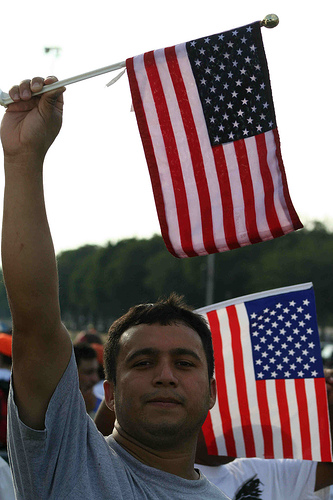Supreme Court: Who’s In Charge Of Enforcing Dignity?

Like everyone else living on this planet, I am informed by me experience. So my take on issues comes from the place where I stand, and have stood. There is nothing in me that moves me to apologize for that – I didn’t chose to come to this existence as a Latino male in the United States, an intelligence with a plan much greater than mine thought this whole thing up.
Years ago, when I was a boy, the string of my experiences crossed paths with a large oak tree that stood across an open field less than 100 yards to the East of my house. We lived about five blocks from the river, on the Mexican side of the border so that tree, a playground for me and my neighborhood buddies during the day, was a refuge for traveling immigrants come nightfall.
They’d congregate under the large branches as soon as night fell, they’d light a fire and they’d wait for the proper time to head north. Often some of the travelers would come to our front door to ask for food and my mother would give them from whatever there was at our table, clothes if there were children in the group, and many times there were. I could hear them through my open window, murmurs of voices, songs sometimes, plans and anticipation more than likely, fears for certain. Come morning they’d be gone.
When I think about the arguments that will be made before the U.S. Supreme Court today, that’s where my thoughts are coming from; from those people, from that tree. I can’t separate the issue from the humanity. I’ve looked into their eyes before they were labeled as undocumented, or alien, or whatever. I’ve known them as people who came to my door, respectful, hungry, in need. Their murmured voices were literally the last thing I heard many nights before I went to sleep.
 I also understand the practicality of what’s happening at the Supreme Court today. I understand that the issue is the law, period. So let’s take that into account. Because the issue is not simply the law, but the splitting of the law into a potential patchwork of 50 different laws. And that’s where the Supreme Court and the old oak tree converge.
I also understand the practicality of what’s happening at the Supreme Court today. I understand that the issue is the law, period. So let’s take that into account. Because the issue is not simply the law, but the splitting of the law into a potential patchwork of 50 different laws. And that’s where the Supreme Court and the old oak tree converge.
You see, the values that inform my experience are universal – treat others as you would have them treat you. I saw that clearly when my mother prepared tacos for strangers at her door (and mom being mom, admonished them to cover up against the cold and be careful on their way). Those are defining American values as well, the dignity that defines us as a nation. The best way to uphold those values is through one law-enforcing entity, not an amalgam of 50 disparate rules. That’s what’s at stake today.
If the Court sides with portions of the SB1070 law it will give states the ability to enact and enforce their own, separate, immigration laws. And many such state level laws, as we’ve seen, don’t respect basic human dignity – dignity and rights are disrespected if you are stopped and detained simply because you look like an immigrant to the person who detained you. It will be very difficult for those who defend the basic human rights of immigrants to scurry around 50 different variations of laws, holding state legislatures accountable for the treatment of human beings.
Whether the agency responsible for enforcing the nation’s one federal immigration law is doing an adequate job or not is a question for another time – we can have that discussion, but that’s not what’s being argued today. Today the issue is whether states have the right to enact and enforce immigration laws. We’ll know what the Justices think by June.
[Photo by ElvertBarnes, Xth-Floor]

